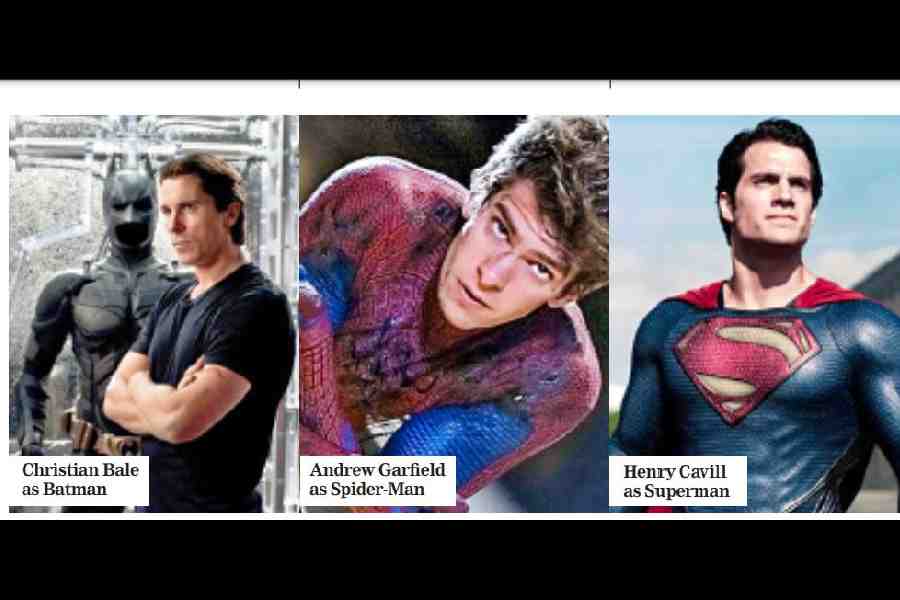Quentin Tarantino, in his 10th and possibly final film The Movie Critic, has ruled out the possibility of casting a British actor in the lead role of a thirtysomething porn-mag journalist. “Nothing against the Brits”, he confided in an interview with Deadline. “I think when people look back on this era of cinema, and it’s just all these British actors pretending to be Americans and all these Australian actors pretending to be Americans, it’s like phantoms. Nobody is acting in their own voice.”
It’s bizarre that he brings up Australians. In the last (and much the worst) part of Django Unchained (2012), let’s not forget that Tarantino gave himself a squawkingly incoherent cameo as a brutish Australian miner. His accent is famously abysmal. If the average quality threshold of Brits playing Americans was anywhere near that bad, he might have a point.
What seems to have escaped his attention is that British actors are an asset Hollywood couldn’t manage without. Take, for instance, the most recent two of Daniel Day-Lewis’s Best Actor Oscars — the roles of Daniel Plainview in Paul Thomas Anderson’s There Will Be Blood (2007), or Honest Abe in Spielberg’s Lincoln (2012). The heft of those performances extends way beyond Day-Lewis’s accent work, utterly persuasive though it was in both cases. There’s no single performance in a Tarantino film that’s a patch on either of those.
Other than Michael Fassbender in Inglourious Basterds, the only Brit Tarantino has ever been willing to cast is his regular favourite Tim Roth. Famously, as you might hear if you gave Reservoir Dogs another spin, Roth tends to struggle with American accents — which is why he pivoted to playing Brits for Pulp Fiction, his squeaky bellhop in Four Rooms, and so on.
A certain resentment
This deficiency is hardly typical. Hugh Laurie wouldn’t have managed eight seasons of House without working very, very hard to nail it. Plus, it can be a learning process: before landing his iconic part as Stringer Bell on The Wire, Idris Elba admits that he was dubbed for a 1994 TV series, because he hadn’t got to grips with playing American yet. He would go to barbershops to let it sink in. Kate Winslet happens to think her Titanic accent is awful, but come Mare of Easttown, she wasn’t just doing a reasonable approximation of a Philadelphia twang, but a subcategory of Delaware County diction which convinced all but the fussiest of Delco locals.
There’s a certain resentment underlying the ability of British actors to step up to this challenge, unlike the notorious Dick-Van-Dyke-isms that can notoriously arise when the shoe’s on the other foot. Despite cantankerous talk of a British (and Irish) “invasion” in Hollywood, our usefulness is hardly a new phenomenon — indeed, you could strongly argue it’s been an industry constant since Charlie Chaplin. Look at the legendary acting careers that began with a trip across the Pond: the likes of Cary Grant, Ronald Colman, Greer Garson or Deborah Kerr, all of whom were sculpted into paragons of well-spoken sophistication, with warhorse accents that fudged the difference between mid-Atlantic and posh Brit.
There’s never been a phase in US film-making without British stars muscling in to play a big part. James Mason. Julie Christie. Michael Caine. Sean Connery. Anthony Hopkins. Ken-and-Em. Hugh Grant. When Christian Bale was cast as Batman, Andrew Garfield (then Tom Holland) as Spider-Man, and Henry Cavill as Superman, we did reach a new kind of generational plateau — Peak British Superhero.
None were huge names until the moment of their casting, which is classic studio penny-pinching — they would certainly have come much cheaper than major American stars, or even embryonic ones. Brits not only save you money, the theory goes, but also — as Samuel L Jackson griped in 2017, questioning the casting of Daniel Kaluuya in Get Out and David Oyelowo in Selma — “they think they’re better trained than we are, for some reason, because they’re classically trained".
The fact that Jackson hadn’t even seen Get Out when he spoke forth made it hard to disentangle a deeply held principle from simple sour grapes. Few actors (pace Jackson) would actively choose to restrict their opportunities by only playing roles that align perfectly with their place of upbringing — let alone the era they were born in, their socio-economic circumstances, and so on.
A globally disproportionate share
Besides, there’s never been more of an abundance of American casting calls. Ludicrous reams of filmed media are now produced across a mind-boggling array of platforms, and the American media-industrial complex continues to pump out a globally disproportionate share. The vast majority of characters in US films and TV shows continue to be American.
Acting is a famously brutal profession, and no one should pretend otherwise. Nor should anyone be weaponising “they come over here”-style xenophobia to guard their turf. No one’s forcing Tarantino to break the casting habits of a lifetime. But he seems to have forgotten that acting, in fact, is pretending — unless Kurt Russell really is a psychopathic stuntman, or Brad Pitt makes a habit of scalping Nazis in his spare time. Hiring a Gary Oldman, an Imogen Poots or a Brian Cox, only to disable their gifts for extremely versatile voice work? It’s like asking a footballer to function on just one leg.











